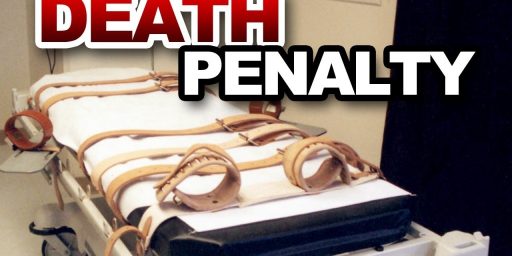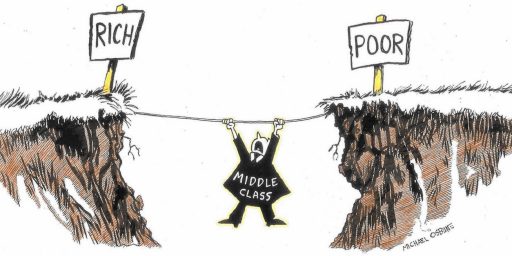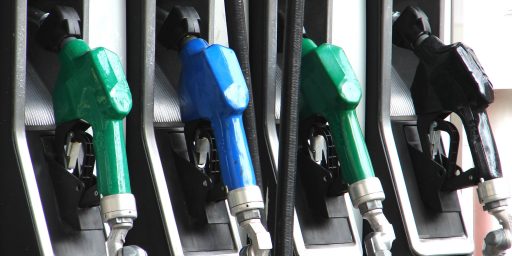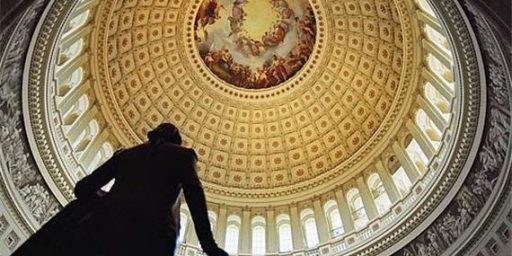The Poor Upper Middle Class
The economic downturn is hitting groups in different ways.

The WSJ headline “The Upper Middle Class Is Getting Squeezed” piqued my interest when I saw it on my phone a couple days back but its clunky login interface didn’t allow me to read it. I got around to it this morning and, well, I’m not impressed.
Mark Yu had a profitable pandemic. Like many Americans, he added to his savings and pulled in big gains from the stock-market rally. He purchased a house in his new hometown of McAllen, Texas, then a duplex and an eight-unit apartment complex in Cleveland.
But 2022 hasn’t been so kind. His expenses have grown because of higher costs for gas, groceries and the dog food for his four German shepherds. The value of his stockholdings is shrinking. He is sending more money back to his family in the Philippines to help them cope with rising prices there. A cracked foundation in his new house cost tens of thousands of dollars to repair.
Mr. Yu, a 33-year-old who has lived in the U.S. since 2014, is now taking on credit-card debt and typically working seven days a week. Previously, he was socking away as much as $3,000 a month into a brokerage account. This year, a couple-hundred is the most he had been able to muster and he hasn’t put anything in for the past three months.
So . . . the man is 33 years old and was, until quite recently, socking away more than most Americans make into a brokerage account on top of a lavish lifestyle while also scarfing up large investment properties? What did he do, cure cancer? It turns out that he’s a physical therapist!
As anecdotes designed to tug at my heartstrings—or even get me to believe my class is being squeezed—this was not very effective. But I’m more of a big picture guy, anyway.
While poorer families might feel the effects of inflation more deeply, they also have had the biggest wage increases and have the smallest share of their net wealth invested in financial markets.
The richest families, meanwhile, have been hurt by market losses but have been insulated from the worst of inflation. Goods that have had the sharpest price jumps, such as gasoline, automobiles and home utilities, account for a relatively small percentage of their spending.
So, I’m in between those—very firmly into the UMC, although by virtue of my wife and I both having a decent income, not because of investments. And, yeah, higher gas (which is coming down significantly here) and food prices have been noticed. My retirement accounts have taken a big hit but, since I don’t plan on retiring soon, I’m not particularly concerned. The market has always had ups and downs but the trend is almost always up.
Finally, we get to the numbers:
Over the first three months of 2022, upper-middle-class families lost a bigger chunk of their stock portfolios than the people who make more than them, according to the Federal Reserve. Since the pandemic started, they saved less than most of the people who make less than them, according to Moody’s Analytics.
The value of their liabilities grew by 2% in this year’s first quarter, more than any other group, as they took on greater debt for auto loans, credit cards and other consumer credit.
I’m not sure there’s much meaningful analysis to be done on a single quarter in the midst of several overlapping global crises. But it sounds like the UMC is simply continuing living a UMC lifestyle and doing it the old-fashioned way: on credit.
Upper-middle-class households are defined here as those earning between $75,301 and $127,300 a year, according to the Fed. They make more money than at least 60% of other households, but less money than the top 20% of earners.
Ah: by this definition, which makes no sense for those of us in the DC metro area, I’m actually well above UMC status. But, then, so is Mark Yu. If you’re making $127,300 a year—much less $75,301—you’re not making massive investments while socking away thousands a month into stocks and sending cash to family abroad.
Regardless, that makes the analysis more logical:
Economists at Bank of America Corp. estimate that upper-middle-class households, as well as the group right below them, are feeling inflation more than other income groups. These households spend a bigger portion of their budgets on driving expenses, since they tend to live in suburbs or more rural areas and commute into cities, they said.
Many of these workers got unemployment benefits during the pandemic, but the benefits didn’t pay as much as their jobs did—unlike lower-wage workers, who often got more money from unemployment benefits than from working. Their savings on travel and events during pandemic lockdowns was less pronounced than that of higher-income households with more discretionary spending power.
Right. I work for the federal government, so thankfully had steady employment throughout the pandemic. Indeed, I kept getting paid while saving money by not needing to commute, buy lunches out, and the like.
And, yes, while I consider $75-$125k to be solidly middle class rather than UMC, that group is in a relatively bad spot: too well-off to benefit much from federal subsidies and yet much more vulnerable to price increases than me.
U.S. households of all income levels saved an additional $2.7 trillion between the first quarter of 2020 and the fourth quarter of 2021, according to Moody’s Analytics, thanks to stimulus checks, enhanced unemployment benefits and being stuck at home. Higher prices have pushed families of almost all income levels to start dipping into their pandemic savings this year. Upper-middle-class households started eating into their pandemic gains earlier and more aggressively.
Despite their relatively large salaries, upper-middle-income Americans have less in excess savings than all but the poorest U.S. households, both in aggregate and per household, according to Moody’s Analytics. (The poorest households are defined as those earning $28,400 or less a year.)
This doesn’t really surprise me. If they’re primarily suburbanites, they’re spending a lot of money on transportation, housing, and the like that poorer urbanites aren’t.
Mark Zandi, Moody’s Analytics’ chief economist, suggests that this is at least partially the result of government policy. Individuals earning more than $99,000 were barred from receiving any of the three pandemic stimulus checks, and those making upward of $75,000 received reduced payments or none at all. Similar “phaseout” income restrictions were placed on the $3,000 child-care tax credit.
Since June 2021, consumer sentiment for households earning $100,000 to $150,000 has fallen by the most of all economic groups, according to an index by data provider Morning Consult.
Right. Those just below them income-wise were effectively making more money than they were. Via government policies that were helping jack up their prices, property tax bills, and the like.
More anecdotes flesh out the situation:
Kern Barrow retired in 2018 as a physician assistant. Last month he returned to work part-time, driving vehicles for a car-rental company three days a week, so he could stop making withdrawals from his declining retirement accounts.
“During the pandemic I saved a lot, was able to bank a substantial amount of money,” said Mr. Barrow, 69. Now, “I’m drawing on that savings this year more than adding to it.”
Mr. Barrow has also cut back on driving, all but cut out restaurants and shopping, and is now less generous with his granddaughters, ages 12 and 16. He also traded in his Dodge Challenger for a hybrid sedan to save on gas.
Daniel Roberts, an IT project manager, retired at the beginning of the year. The $100,000 drop in his 401(k) has him rethinking the idyllic postwork life he envisioned, especially since he taps the fund for his $1,400 monthly mortgage.
The home that he and his wife, Robin, own in Idyllwild, Calif., a town in the San Jacinto Mountains where the mayor is a golden retriever named Maximus Mighty-Dog Mueller, has more than doubled in value since they purchased it in 2017. Still, Mr. Roberts feels stuck. “There is no way we could rent a similar home in California for that amount if we were to sell,” he said.
What’s more, home sales are slowing. While median prices are still rising, existing-home sales have fallen for five months in a row to the lowest rate since June 2020. Sales of homes priced below $500,000 declined by 19% in June from their June 2021 level, according to the National Association of Realtors, compared with an 11% decline for all houses. The share of sellers lowering their asking prices hit a record during the four weeks ended July 3, according to real-estate brokerage firm Redfin.
Mr. Yu, the Texas physical therapist, is trying to get through this year.
The homeowners insurance premium on his Texas home has doubled, and the taxes on his Cleveland investment properties have increased significantly. He also has spent heavily to refurbish and repair those properties, and he said he is paying out more on them each month than he is making back in rent.
I see these situations as very different.
The current recession is most damaging to those who are retired or planning to retire right now. Savings have effectively been stolen from them by inflation. Their tax burden is up. Their investments are down, meaning they have to dip into principal rather than interest to meet expenses. And their house, which many count on to cash out and downsize as they go into retirement, is now suddenly worth much less than it was six months ago.
On the other hand, I have zero sympathy for Wu. He swooped into a down market hoping to take advantage of it and make a profit and he’s now stuck with depreciated assets. That’s life in the big city.






Agree with your analysis.
As for the WSJ piece, my reaction was, “Oh, FFS.” If you are in this bracket, you have the ability to save and live below your means without worrying where your next meal is coming from or if you’ll be able to make the mortgage. Getting upset because you’ve overextended yourself is borderline childish.
I do feel for those who are retired (my parents fall into this group), and those who are on the cusp of retiring.
@Jen:
I hear some of these people have been so hard hit, they have to wash their own Mercedes as they can no longer afford to pay for detailing.
@Kathy: I had to mow my own lawn!
I’m turning off my snark-o-matic. Sadly, that leaves me with nothing to say.
You sure that was WSJ? It sounds like NYT’s “horrors of squeaking by on less than a quarter mil a year” beat. At least the guy didn’t blow it all on Bitcoin.
I was around for the great stagflation of the late 70s. Somebody at the time did an econ analysis of who actually got hurt by inflation. The famous retirees on fixed incomes got COLA and did OK. Most people through raises and/or asset inflation did OK. They concluded the only identifiable demographic that got seriously hurt were college faculty. So maybe you and Dr. T should be worried.
According to Zillow the value of my house is down about 1% and my stocks/bonds are down about 15%. But since I bought my house three years ago it has appreciated by 47%. And my stocks/bonds are still up over the last three years. So what I’ve ‘lost’ is some portion of what I ‘made’ by doing absolutely nothing.
I don’t seem to be losing weight due to malnutrition.
It’s good to have been poor at some point in your life. Perspective.
This gets to a phenomenon that I experience also. This guy is retired but doesn’t want to draw on his retirement savings. Even wants to add to them. But drawing down is what they are there for.
I totally get it. I’m 68 and don’t want to touch my 401K and Roth accounts either. I suspect that most of us don’t want to live off our savings yet. There is a lot of uncertainty in retirement (including how long you are going to live and what medical expenses you may incur. And your expenses really don’t go down too much.
I’m always torn on these kinds of articles and the inevitable snarky, unsympathetic replies they draw. On the one hand, I agree that having some perspective about one’s situation is important, and complaining about how hard you have it when you’re still better off than the vast majority of people isn’t a good look. On the other hand, regardless of how well you’re doing relative to others, losing ground relative to your own goals and prior standard of living is still going to feel pretty shitty and stressful, so I don’t think feeling bad about it when it happens to you is particularly unusual or awful.
@R. Dave:
I agree that people who are losing ground relative to where they were a year or 3 years ago should elicit sympathy from us, whether that person is lower-lower-class, or upper-middle-class. What I find curious is why the media does such a shitty job finding sympathetic people. I think of that CNN segment about how the rising cost of milk was hitting hard the family with 17 children who bought 14 gallons of milk a week (not exact numbers, but honestly pretty close IIRC). Or this guy who could buy a duplex and then a freaking apartment buildingduring one of the most overinflated real estate markets in our history.
These are the best you could find?
In my ‘rolodex’ I can find a single mother living in DC on $100,000 a year who is dealing with rising rents, rising daycare costs, and is truly struggling to keep her head above water, despite being UMC and being a generally responsible person. I have another family of four making ~$125K in upstate NY, whose suddenly-very-valuable home has tripled their property taxes, and are making the hard decision to upend their lives and move halfway across the nation in order to find a cheaper COL.
People who have made the right choices, lived within their means, but who are still sinking–sympathetic to most readers.
Instead we get “Johnny McLandlord’s passive income isn’t allowing him to live extravagantly.” Boohoo.
Having led the lives of most self-employed people in the music business, it has always been feast or famine. I do not miss quarterly payments, intermittent health care coverage, and schmoozing. Engineers and sidemen are hourly wage slaves, living one gig to the next. We were in the gig economy our whole working lives.
So all this is easy for us to adjust, even if not much fun. We have no debt. I learned long ago to keep the overhead low and options open. We are far from UMC, but live well, if simply.
Ever since I lowered my expectations, life has been a bit easier, too.
I wish to object to Dr. Joyner’s use of the word “stolen” in reference to the financial situation of the net asset value of near retired and recently retired people. Over the past 30 years the Dow Jones has increased at an inflation adjusted rate of nearly 10%. This has been a huge gravy train, and the fact that it’s down the past year should be something that someone who was thirty years old in 1990 has factored into their plans. Inflation’s impact can be tempered by older people because we often already have houses, cars, furniture, etc, and don’t need to get into the market to buy at inflated prices. The example of Roberts with a house in the San Jacinto Mountains is illustrative; his house’s potential price has doubled in the past five years. If he had to sell a replacement would be expensive. However, he would be the recipient of the run up in his house price, and why would he want to sell?
I live in a house I bought ten years ago. I drive a car with 50,000 miles on it. I have seen Springsteen three times already. I started planning for retirement around 1985 when the Dow was 1330. If someone would have promised me that the Dow would be above 30,000 in 2022, I would not have believed that we could be so lucky. Yes, some of my assets have had a nominal decline, but nothing has been stolen; I have received a great bounty.
The impact of inflation on young people is a different story, of course. I was starting a business and a family in 1980 when inflation was big and remember the problems. Of course, my mortgage back then was 9.5%. Things are actually better now.
@Kathy: Back in the 1980s, the same sort of news item–in that case a television news article–lamented the problems of someone struggling to scrape by on about $400k if I recall correctly. His debt management consultant had imposed restrictions–no credit cards, a $1oo/week personal budget, bring lunch from home (at $100/week, I’d still have been eating out at least most of the time, but…). “And you’ll have to wash your car yourself” could easily have been one of the draconian restrictions he faced.
The debt management guy had one classic line that cracked me up during the report: “Most people probably don’t know how hard in can be to scrape by on only 3 or 4 hundred thousand dollars.” Ayup. I’d be one of those people, all right.
@gVOR08: The stagflation period was the only time in my life that I was making more than I’m making now–and even that was mostly because of overtime pay. My social security payment, a ~$600/month pension, and whatever I make during the year working as a substitute teacher at ~$160/day amount to more than I made in my last American job before I left to teach in Korea (by at least 50%). And I had one of those highly touted “manufacturing jobs” that are supposed to rescue the working class if we can only get them back here.
The stagflation era was the best economic time of my life until I moved to more Gini-coefficient favorable Korea.
@becca: “Ever since I lowered my expectations, life has been a bit easier, too.”
Back in the 80’s Esquire Magazine published some excerpts from a new book their economics editor, Andrew Tobias, had just finished writing about personal finance. One excerpt discussed the idea of living below your means–making $40K? live like you make $30K, and so forth. (Yeah, once upon a time $40K was an example of a “typical MC or UMC” income. Now it’s only MC because it’s roughly in the median zone.)
Tobias went on to note that he understood the objections of some economists that if everybody chose to live that way, the economy would tank. (Living up to the hilt of your means is a well-recognized economic principle for juicing the economy and production.) His counter was that while that fact may well be true, most people will decline to live that way, so the people who choose to can profit from thrift.
@Slugger:
In 1982 my company president called a management meeting to announce that while we hadn’t sold anything in some months, he was confident Reagan was doing the right things with the economy and we’d continue to build machines to inventory to be ready for the boom. I went home and spent the weekend shotgunning out resumes. I got a new job out of state just before the company went under. I forget what mortgage rates were at the time, but we had to sell our house in MI on land contract because mortgage rates had exceeded the state’s usery law limit.
@Michael Reynolds:
I grew up ketchup sandwiches poor. I know how fortunate I am now. The idea that “I’m being squeezed” because my IRA lost a few percentage points, and gas is more expensive would be laughable if it wasn’t so offensive. I know people in my old neighborhood who are having to make the choice between food and gas to get to work because the inflation on basic goods has been so steep. I know because I’m helping them out.
American’s as a whole do not realize how good we have it. Seriously, as Jen says above, “Oh, FFS!”
@Just nutha ignint cracker:
And no Republican, and damningly few Democrats, would admit it wasn’t that they were manufacturing jobs, but that they were mostly union jobs.
@R. Dave:
This is true, and I have sympathy for those feeling stress.
However, as has been pointed out, perspective should help ease such stress. Not simply “Hey, your’e doing great compared to those below,” but rather “you’re still doing well enough and will recover in time.”
Also, it’s hard not to get snarky when you hear how people making a lot more money than you now have it bad economically.
Yeah, I guess I think even Johnny McLandlord deserves sympathy. Losing your investment portfolio after a decade+ building it up so you could live on the passive income is a major setback in one’s life goals, so I’m not sure why someone experiencing that setback isn’t entitled to feel shitty about it or why we shouldn’t feel sympathy for them. Honestly, once your basic needs are reliably met – which is the case for pretty much everyone in the US who’s working class or higher – relative change from one’s baseline matters more than the absolute value of that baseline. Having to sell your home and downgrade to a smaller one because you lost your job is an emotionally jarring event whether your home was a $2 million McMansion or a 60’s era tract house.
It’s also a bit galling to see the WSJ trying to perpetuate this sort of punching-down stupidity:
This is designed to reinforce the prejudices of their readership. “Biggest wage increases” (because going from $12.75 an hour to $15.00 is *JACKPOT* territory/s) and “got more money from unemployment benefits than from working” (because they weren’t being paid what they were worth in the first place) is some bullsh!t of the highest order.
@gVOR08:
I understand perfectly why politicians don’t want to admit THAT.
@R. Dave: “Honestly, once your basic needs are reliably met – which is the case for pretty much everyone in the US who’s working class or higher –…” [emphasis added]
Yeah. I wish I believed that was still true, but I live in an area where even rents in marginal neighborhoods are starting to outpace income (I just was told by an apartment search engine that there are no apartments that I qualify to rent at $2000/month gross-my approximate minimum monthly). And there’s the question of the 2 or 3 hundred homeless students the districts I substitute teach at are saying they provide service to. They can’t possibly all be emancipated minors/living in foster care/etc. (And certainly not all “sponging off the system” as some of my fellow community members would have us believe.)
Alternative framing: Mark Yu is an immigrant and POC. He worked hard to get an advanced education that allows him to provide high-touch, essential patient care in a community that is majority minority. He provides financial support to his family in the Philippines. He has also infused money (invested in two rental apartments) in a shrinking and increasingly distressed city.
I don’t understand the negativity thrown his way. Of course, he could be a scheming asshole, but I don’t get that from the story. He’s not complaining about how he has it so much worse than anyone else. Nor is he asking for a handout or bailout. Rather, he is talking about his lived experience.
Will he be able to ride out this situation? Highly likely. And still, he is facing some setbacks. And these are disheartening. I wish him the best.
I seem to remember several years ago an article was published by an economics prof. at Northwestern U. complaining bitterly because he “had to live” on $250K/year.
It did not go well with him.
As far as the WSJ is concerned, the upper middle class are like the poor. Not being able to sock away $3,000 a month for your brokerage account is no different than parents not being able to feed their family. A tragedy of epic proportion.
@Mimai: Mark Yu is living comfortably, and could probably cut some more expenses if he needs to. There are people working multiple jobs who met the definition of living in poverty. Let the WSJ profile a few of these families.
@senyordave:
You may be right that he could cut some expenses. Indeed, most people (even those below the poverty line) could probably cut some expenses. And I would be thrilled if the WSJ profiled such people. But the fact that they did not strikes me as poor justification for snarking at Mark Yu.
@Mimai: The vast majority of the snark is directed at the WSJ. The snippets of the article makes it seem like something that really is cringeworthy. Guy who was making tons of money n market lost some of it, isn’t quite so flush with cash. Inflation hurts the lower middle class and working poor so much harder.
My sympathy for anyone 55+ who has lost a % of their portfolio that is similar to the % loss of the stock market as a whole is extremely limited, because it means that they never rebalanced their portfolios to match the actual risk tolerance for their stage in life. No one is making you keep 80+% of your retirement money invested in common stock.
It’s amazing how quickly progressives become “personal responsibility” / “consequences of your actions” conservatives whenever the person taking a hit from a bad economy has more than a lower middle class income. It’s almost like a lot of progressives are motivated more by class envy and spite than by empathy and a recognition of the role external factors play in a person’s success or failure. But no, that couldn’t be, right?
@R. Dave: My issue is with the WSJ’s framing of it as “the REAL victims here are the upper-middle class.” It’s pandering to their readers, certainly.
Of course it’s upsetting when your best-laid plans go awry, based on nothing more than bad luck. But the people outlined in the article aren’t destitute. They aren’t wondering how they will eat, or if they’ll have a roof over their head. It’s possible to both commiserate with them and not see them as victims. Heck, our portfolio isn’t where it was and we might have to work a few more years than anticipated unless things bounce back faster than expected.
In fact, I’d LOVE for the end product of this to be that everyone is more appreciative of the role dumb luck plays in successes and failures. As a society we tend to equate fortune with being the result of hard work and being poor with making bad choices. Being rich is virtuous, and being poor is because you just aren’t working hard enough. That’s garbage, and if this article manages to get that point across, that would be a good thing. I’m not going to hold my breath, however.
Good article! It’s so strange that the poor people saved more money than the middle class